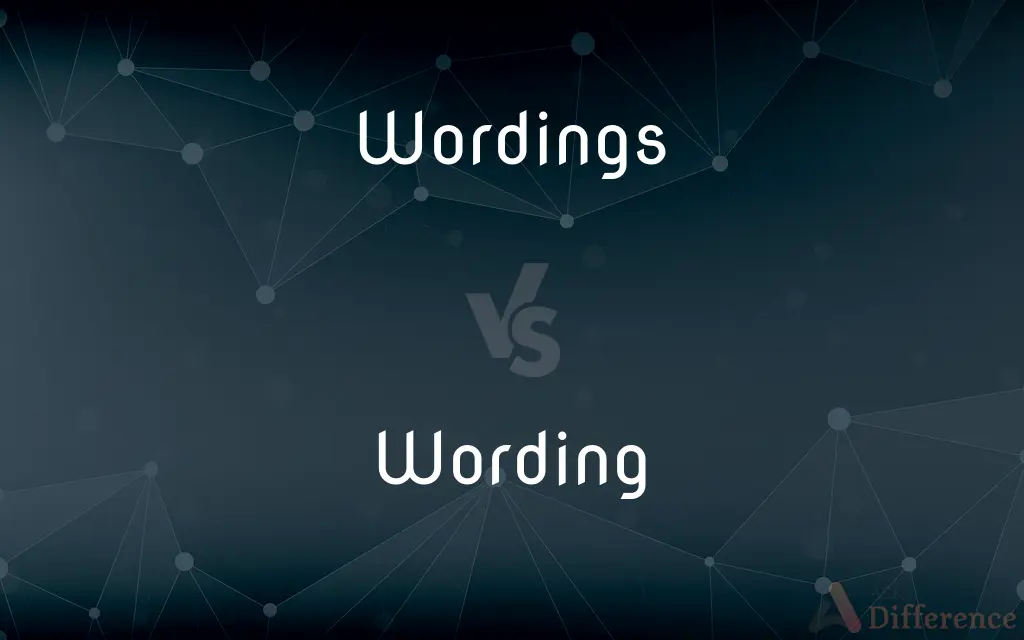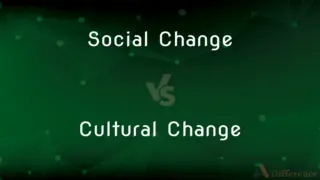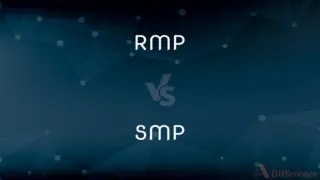Wordings vs. Wording — What's the Difference?
Edited by Tayyaba Rehman — By Maham Liaqat — Published on July 20, 2024
Wordings refer to different ways of expressing something, while wording is the choice or style of words used in a particular context.

Difference Between Wordings and Wording
Table of Contents
ADVERTISEMENT
Key Differences
Wordings imply variations or alternatives in the expression of an idea or statement. This term is often used when comparing different versions of a text, highlighting how the choice of words can alter the message, tone, or clarity. Wordings are crucial in legal documents, contracts, and any context where precision and nuance are paramount.
Wording, in singular form, refers to the specific selection and arrangement of words in a text or speech. It focuses on the style and composition of language used to convey a message effectively. The choice of wording can greatly influence the reader's or listener's perception, making it a key consideration in communication, marketing, and literary composition.
While wordings offer options for expressing an idea, wording is concerned with the craft of assembling words to create a coherent and impactful message. This distinction is important in tasks that require careful consideration of language, such as writing, editing, and public speaking.
Choosing between different wordings involves evaluating the effectiveness, clarity, and appropriateness of each option. On the other hand, refining wording is an act of fine-tuning the language to achieve the desired effect or to meet specific criteria.
In legal and formal contexts, the implications of wordings can be significant, as slight differences in expression may lead to different interpretations. Conversely, the overall wording of a document or speech shapes its readability, persuasiveness, and memorability.
ADVERTISEMENT
Comparison Chart
Definition
Variations in the expression of an idea.
The choice or style of words used.
Focus
Comparing different versions or expressions.
Crafting a coherent and impactful message.
Application
Legal documents, contracts, precision writing.
Communication, marketing, literary composition.
Importance
Precision and nuance in expression.
Effectiveness and perception of the message.
Key Consideration
Evaluating alternatives for clarity and impact.
Fine-tuning language to achieve desired effect.
Compare with Definitions
Wordings
Different expressions or versions of a text or statement.
The contract's wordings were carefully reviewed to avoid ambiguity.
Wording
The specific selection and arrangement of words.
The wording of the invitation sets the tone for the event.
Wordings
Alternatives in phrasing that reflect varied nuances.
The policy's wordings were debated to ensure clarity and fairness.
Wording
The style of expression in written or spoken language.
His speech's wording was praised for its eloquence and clarity.
Wordings
The act of formulating different ways to say something.
Crafting the survey questions involved exploring various wordings for accuracy.
Wording
The manner in which a message is communicated.
The advertisement's wording was designed to attract attention.
Wordings
Variations in language that can lead to different interpretations.
Legal outcomes can hinge on the specific wordings of a law.
Wording
The language used to express an idea or instruction.
The recipe's wording was clear, making it easy to follow.
Wordings
Choices of expression that can affect tone and meaning.
The wordings of the apology letter were adjusted to convey sincerity.
Wording
The choice of words to achieve a particular effect.
The novel's wording captivated readers with its vivid imagery.
Wordings
The words selected in expressing something, or the style in which words are used.
Wording
The words selected in expressing something, or the style in which words are used.
Wordings
Plural of wording
Wording
A choice of words and the style in which they are used in a given context.
Wording
The act or manner of expressing in words; style of expression; phrasing.
It is believed this wording was above his known style.
Wording
The manner in which something is expressed in words;
Use concise military verbiage
Common Curiosities
Why is the choice of wordings important in legal documents?
Because different wordings can lead to varied interpretations, affecting the enforceability and outcome of legal agreements.
Why might someone consider different wordings for a statement?
To refine the expression for clarity, effectiveness, or to better match the intended audience's expectations and understanding.
How do wordings and wording contribute to effective writing?
By offering alternatives (wordings) for precision and by crafting messages (wording) that are coherent and impactful, contributing to clear and persuasive communication.
Is there a situation where wordings would be more important than wording?
In legal and formal contexts, where the exact expression can have significant implications, evaluating different wordings for precision and nuance becomes paramount.
How does wording affect communication?
The choice of wording can influence the clarity, tone, and impact of the message, thereby affecting the audience's understanding and response.
Can changing the wording alter the meaning of a sentence?
Yes, even minor changes in wording can significantly affect a sentence's meaning and the reader's perception.
Can the choice of wordings affect a contract's interpretation?
Absolutely, as varying wordings can lead to different legal interpretations, affecting the obligations and rights of the parties involved.
What role does wording play in marketing?
It's crucial for engaging the audience, conveying value, and prompting action, as the right wording can greatly enhance the appeal of marketing messages.
How can one improve their ability to choose the right wording?
Through practice, awareness of the audience, understanding the context, and seeking feedback to refine language use for the desired impact.
Why is it important to consider both wordings and wording in editing?
To ensure that the text not only communicates the intended message clearly and effectively but also considers alternative expressions for accuracy and impact.
Share Your Discovery

Previous Comparison
Social Change vs. Cultural Change
Next Comparison
RMP vs. SMPAuthor Spotlight
Written by
Maham LiaqatEdited by
Tayyaba RehmanTayyaba Rehman is a distinguished writer, currently serving as a primary contributor to askdifference.com. As a researcher in semantics and etymology, Tayyaba's passion for the complexity of languages and their distinctions has found a perfect home on the platform. Tayyaba delves into the intricacies of language, distinguishing between commonly confused words and phrases, thereby providing clarity for readers worldwide.










































